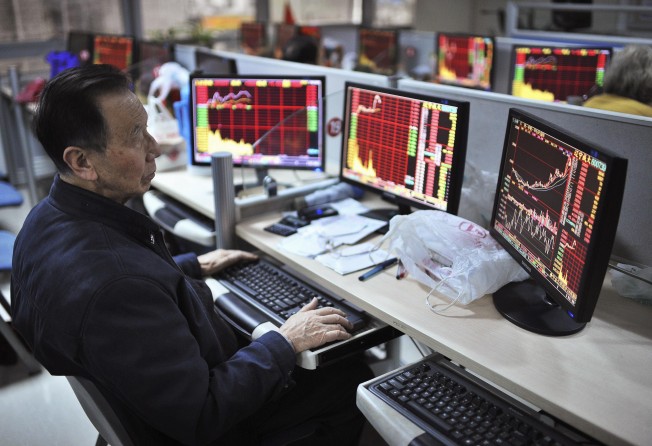
High-risk shadow banking fuelling a share market bubble
Lack of protection and information offered to investors in wealth management products on the mainland leaves many vulnerable to losses

Fancy cooking up a bubbling share market with daily trading of more than 900 billion yuan (HK$1.13 trillion)? Get hold of a pot overflowing with liquidity, and then add margin financing, wealth management products and notoriously aggressive trust companies. Toss in the fee-hungry banks and it is ready to be served.
The contribution of margin financing to the recent rally in Shanghai is beyond doubt, as the chart shows. It has soared from the September average of 360 billion yuan to 487 billion yuan last month and then 556.8 billion yuan on Wednesday. That is 2.7 per cent of the Shanghai market's capitalisation, double the average in the US market.
Add the Shenzhen number and margin finance swells to 856.4 billion yuan on the mainland. But, as with official figures on the mainland, it could well be higher.
A glance at a dozen of the so-called "preferred" wealth management products available on the website of a listed mainland bank tells you why. They are put under the A share-related category; that is a big attraction given the recent performance.
Click on the icon and you will find it described as a "prudent" product suitable for anyone with some investment experience. It is expected to generate about 6 per cent annual return. The minimum investment is 100,000 yuan.
Stock market plus "prudent" plus 6 per cent - that sounds like a good alternative to bank savings amid interest rate cuts.
The fine print carries a very different picture. Your money will be lent to an unknown entity to bet on the stock market.
This is how it begins. A trust company sets up an umbrella structured trust to cater to various stock speculators who want more than what the official margin finance limits will allow.
Under the trust are different units that are nothing but stock "pools" managed by the speculators. He or she puts up 40 yuan and gets 100 yuan from some so-called preferred investors to make the bet. That is 250 per cent gearing; it varies with different units.
The unit is then distributed to the man in the street through the banks. An unsuspecting you will become the preferred investor. Your return is capped at 6 per cent and the rest is for the speculator.
The only "protection" you have is the margin call made by the trust company on the speculator in the event of a market fall. He or she is solely responsible for topping up the margin. The so-called protection is, however, false. The product's documentation provides zero information on the identity of the speculator or his financial strength in case of a margin call. Neither does it detail the stock portfolio nor its liquidity in case of forced sale.
If the market goes south, one will end up with nothing. "I couldn't even begin to call it a high or low-risk product, as all necessary information is missing," a private banker in Hong Kong said.
Yet, these products are hot - thanks to the market rally.
The listed bank with the web promotions has sold at least 1.1 billion yuan of these products since March. That does not include sales to its private-bank clients. Tales of billions of yuan worth of products sold within hours at private banks are not unheard of.
There can only be one of two explanations: nobody reads the fine print in a bull market or everybody is expecting the government to bail them out when the market goes bust.
Then there is the amplifying effect that these products will have in a market downturn.
For one product, its repayment ability was measured by a risk indicator that was valued at 152 when it was marketed to you.
If the stock price goes down and pushes the indicator below 135 - the warning mark for your 6 per cent return - and the margin call is not met, 40 per cent of the stocks will be sold by the trust company. That means a forced sale will happen if the stock price goes down by only 17 per cent - a very thin buffer by any count.
All the stocks will be liquidated within three days if the indicator goes below 127.5 - the loss-cutting mark that shows a threat on your investment - and the margin call is not met.
Yet, for now, who cares?